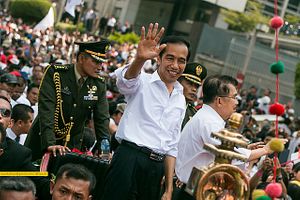Indonesian President Joko ‘Jokowi’ Widodo’s only nominee for the country’s top police post has been named by an anti-corruption agency as a suspect in a money laundering scandal. But the nomination was not withdrawn and Congress proceeded to endorse the candidate despite the corruption case. Because of this, Jokowi has faced accusations that he succumbed to political pressure instead of aggressively pursuing reforms and fighting corruption in the bureaucracy.
Immediately after his nomination, police Commissioner General Budi Gunawan was listed by the Corruption Eradication Commission (KPK) as a suspect in a bribery and money laundering case. The agency cited a report from the Financial Transaction Reports and Analysis Center (PPATK), which traced suspicious bank transactions involving the three-star general between 2005 and 2008. Budi reportedly made several deposits and withdrawals amounting to $5.9 million in several banks while he was stationed at the national police headquarters.
If found guilty of violating the anti-corruption provisions of the criminal code, Budi could face four to 20 years in jail plus a hefty fine.
Many suspected that Budi was appointed despite his tainted record because of his close ties to former president Megawati Sukarnoputri, who is also the leader of the Indonesian Democratic Party of Struggle (PDI-P) that supported Jokowi’s candidacy. Budi’s nomination is seen by some as a clear example of the former president’s strong influence in the Jokowi administration.
The Jakarta Globe published an editorial urging Jokowi to quit Megawati’s party and break out from the former president’s shadow: “He is the president of Indonesia who is voted in by the people. PDI-P and Megawati will continue to be his nightmare – forcing bad policies and appointments for their own interests. He will not be able to control the party as he is not in Sukarno’s bloodline.”
Jokowi’s refusal to cancel Budi’s nomination disappointed supporters who expected the new president to be aggressive in reforming the bureaucracy. After all, Jokowi became nationally prominent as mayor of Solo City and later as Jakarta governor because of his innovative leadership and popular image as a crusading hero of the common people. After his election victory, Jokowi announced the “Nawa Cita” (Nine Priority Agenda) of his presidency, which included the rejection of a weak state “by reforming the system through corruption-free dignified, and reliable law enforcement.” When news of the Budi nomination scandal broke out, many asked if Jokowi was already abandoning his commitment to the electorate.
An online petition was launched urging Jokowi to drop Budi and appoint a new national police chief with a clean record. The Twitter hashtag #ShameOnYouJokowi trended globally reflecting the anger of many people, among them those who believed that Jokowi would usher in an era of reform in the country.
Perhaps hurting from the criticism, Jokowi decided to postpone Budi’s inauguration. But this created a new complication when some party leaders felt insulted that the president had ignored the parliament’s endorsement. The threat of impeachment has even been made.
Jokowi will likely survive this political crisis, the first serious one under his administration. But his reputation as a reformist has taken a serious hit.

































